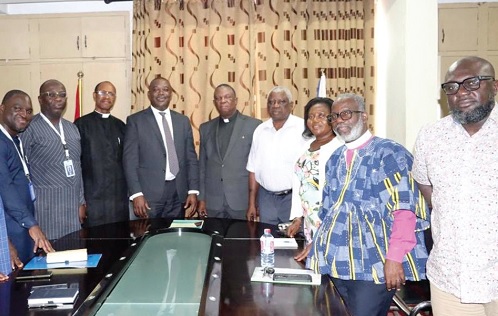The Christian Council has pledged its support for the Ghana Tertiary Education Commission’s (GTEC) regulatory mandate to safeguard the country academic integrity.
To start with, the Council has therefore given an assurance that it will ensure its members comply with the directive of the use of academic titles.
The General Secretary of the council, Rev. Dr Cyril G. K. Fayose, gave the assurance when management of the GTEC, led by its Director-General Professor Ahmed Jinapor paid a courtesy call on the leadership of the council.
With Prof. Jinapor were the Director, Corporate Affairs, Jerry Sarfo; Head, Institutional Accreditation, Harry Kwame Opoku, and the Head, Protocol and Public Relations, Charles Mbeah.
Management members from the Christian Council at the meeting also included the Coordinator for Interfaith and Ecumenical Relations, Rev. Jehoiada G. Amuzu; the Director, Finance and Administration, Dr Frederick E.M. Kutsienyo and Administration and Human Resource Officer Veronica Acquah.
Focus of discussion
The meeting was to solicit the support of the council to help sanitise the tertiary education space, with particular reference to the use of honorary titles as though earned and also the running of unaccredited institutions.
The discussion, therefore, focused on the growing trend of individuals and institutions conferring and using honorary academic titles such as “Dr” and “Professor” without fulfilling the requisite academic or accreditation standards.
Section 8(4)(d) of the Education Regulatory Bodies Act, 2020 (Act 1023), mandates the Commission to:
“Regulate the use of higher education nomenclature and titles including ‘university,’ ‘college,’ ‘emeritus,’ ‘professor,’ ‘doctor,’ ‘chartered,’ and related terms.”
Fairness
Rev. Dr Fayose said even though the council supported GTEC to protect the integrity of tertiary education, its operations should not give the impression of selective targeting, adding that if it was wrong, “it is wrong irrespective of who is involved”.
“So, we need some guidance from GTEC, stating clearly what the protocols are, what you can use, and where you can use it, and how you can use it, before we start cracking the whip.”
“If we don't do that, we have to be careful how we do it so that it doesn't seem like we are discriminating and treating some people unfairly,” Rev. Dr Fayose added.
He expressed concern about the proliferation of foreign institutions that were offering PhD programmes that might not be accredited even in their own countries.
Rev. Dr Fayose observed that in the quest to obtain higher education, some people paid fees to obtain doctorate degree from such an institution, “only to realise that it is not accredited.”
He wondered if GTEC could frequently publicise accredited institutions (both local and international) as a way for potential students to verify institutions with good standing.
Responding, Prof. Jinapor commended the council for its readiness to support the execution of its regulatory mandate and explained that there was no ambiguity regarding the use of honorary titles.
Use of honorary titles
He said the commission did not bar people who played certain critical roles in society from being honoured, but that such honours should not be used as though earned.
Speaking specifically on the honorary professorship, Prof. Jinapor explained that the title “Professor” was reserved for academic professionals within accredited institutions following a clearly defined academic progression.
He added that only the Governing Council of a chartered university may confer the title “Professor,” based on merit and academic qualifications.
“The term ‘honorary professor’ is non-existent under Ghana’s tertiary education framework and any individual using such a title is misleading the public and may be engaged in fraudulent conduct,” Prof. Jinapor explained.
Unaccredited institutions
On unaccredited institutions, he advised that anyone going for higher academic qualification should first check the accreditation status of that institution.

